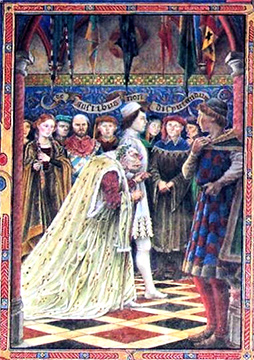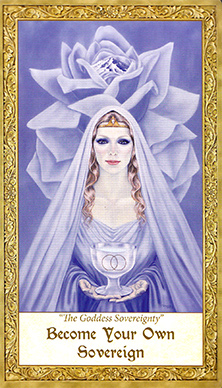The Marriage of Sir Gawain and Dame Ragnelle

My first reference to Sovereignty was found in the Tale of the Marriage of Sir Gawain and Dame Ragnelle, in the Arthurian Grail Legend. In brief, King Arthur is cornered in the forest by an armed knight who threatens King Arthur’s life. The knight tells the king that he must return in a year’s time with the answer to the following question, What is it that women most desire?, and if he fails to give a satisfactory answer he will cut off the king’s head.
King Arthur returns to his castle distraught. His nephew Sir Gawain suggests they both go out riding into the country separately looking for answers to this question. With some hopelessness, King Arthur returns to the forest for inspiration and he meets an old hag who tells him that she will give him the answer if Sir Gawain marries her. The king returns to the castle and Sir Gawain agrees to the marriage. Arthur returns to the forest, meets the hag, and once she hears that Sir Gawain has accepted her terms, she reveals that what women desire most is sovereignty, the ability to choose for themselves.
The Goddess of Sovereignty and the Mabinogion

I next encountered sovereignty was through the Mabinogion, the first written collection of Welsh-Celtic-Gaelic Mythos. Celtic mythology is filled with powerful, and mysterious queens, both mortal and divine. Most of the names of the legendary queens and goddess translate to a form of Great Queen. Regardless of the specific narrative, the roles of these great queens remained consistent. They personified power, authority, and strength; and the Lady of the Land, and only through union with them could a king legitimately rule.
To the Celts, sovereignty was not about the right to rule over a clan or country; sovereignty was a divine power granted by the goddess of the land. The goddess and the land were one and the same. By union with the goddess, the king became connected to the land and the people. The fate of the land became intertwined with his. Any blemish or unworthy deed of his would be felt by the land and any mistreatment of the land would cause him to lose his kingdom. The gift of sovereignty was NOT shared; instead it was bestowed upon the king by the goddess, and he acted as her representative.
The right to choose, as we saw in the The Marriage of Sir Gawain and Dame Ragnelle, is reflected in all of the Great Queen mythos. The goddess maintains the right to choose her lovers and confer sovereignty on a mate she deems most worthy. She acts in the best interest of the land.




